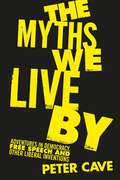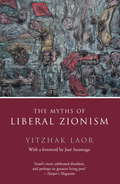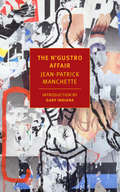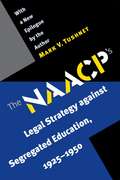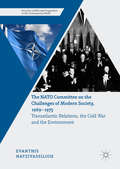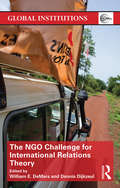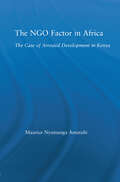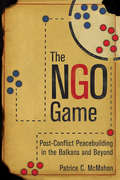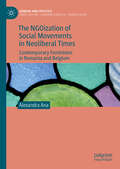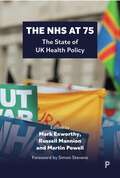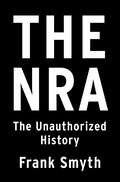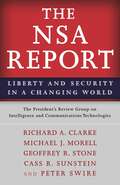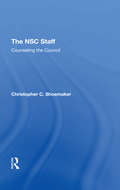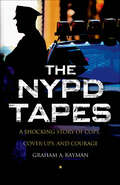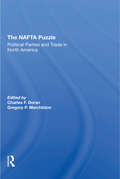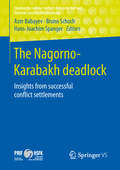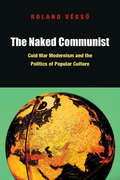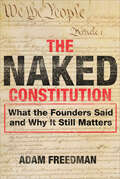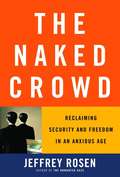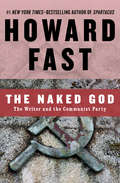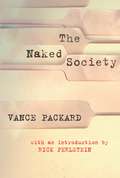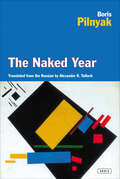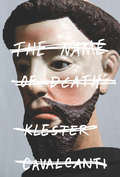- Table View
- List View
The Myths We Live By: A Contrarian's Guide to Democracy, Free Speech and Other Liberal Fictions
by Peter CaveIn this witty and mischievous book, philosopher Peter Cave dissects the most controversial disputes today and uses philosophical argument to reveal that many issues are less straightforward than we'd like to believe. Leaving no sacred cow standing, Cave uses ingenious stories and examples to challenge our most strongly held assumptions. Is democracy inherently a good thing? What is the basis of so-called human rights? Is discrimination always bad? Are we morally obliged to accept refugees? In an age of identity politics and so-called "fake news," this book is an essential resource for reinvigorating genuine public debate —and an entertaining challenge to accepted wisdom.
The Myths of Liberal Zionism
by Yitzhak LaorYitzhak Laor is one of Israel's most prominent dissidents and poets, a latter-day Spinoza who helps keep alive the critical tradition within Jewish culture. In this work he fearlessly dissects the complex attitudes of Western European liberal Left intellectuals toward Israel, Zionism and the "Israeli peace camp." He argues that through a prism of famous writers like Amos Oz, David Grossman and A.B. Yehoshua, the peace camp has now adopted the European vision of "new Zionism," promoting the fierce Israeli desire to be accepted as part of the West and taking advantage of growing Islamophobia across Europe.The backdrop to this uneasy relationship is the ever-present shadow of the Holocaust. Laor is merciless as he strips bare the hypocrisies and unarticulated fantasies that lie beneath the love-affair between "liberal Zionists" and their European supporters.
The N'Gustro Affair
by Jean-Patrick ManchetteThe debut novel of a pioneering author of French crime thrillers.Mean, arrogant, naive, sadistic on occasion, the young Henri Butron records his life story on tape just before death catches up with him: a death passed off as a suicide by his killers, French secret service agents who need to hush up their role—and Butron&’s—in the kidnapping, torture, and murder of a prominent opposition leader from a third-world African nation in the throes of a postcolonial civil war.The N&’Gustro Affair is a thinly veiled retelling of the 1965 abduction and killing of Mehdi Ben Barka, a radical opponent of King Hassan II of Morocco. But this is merely the backdrop to Jean-Patrick Manchette&’s first-person portrait (with shades of Jim Thompson&’s The Killer Inside Me) of a man who lacks the insight to see himself for what he is: a wannabe nihilist too weak to be even a full-bore fascist.
The NAACP's Legal Strategy against Segregated Education, 1925-1950
by Mark V. TushnetThe NAACP's fight against segregated education--the first public interest litigation campaign--culminated in the 1954 Brown decision. While touching on the general social, political, and economic climate in which the NAACP acted, Mark V. Tushnet emphasizes the internal workings of the organization as revealed in its own documents. He argues that the dedication and the political and legal skills of staff members such as Walter White, Charles Hamilton Houston, and Thurgood Marshall were responsible for the ultimate success of public interest law. This edition contains a new epilogue by the author that addresses general questions of litigation strategy, the persistent question of whether the Brown decision mattered, and the legacy of Brown through the Burger and Rehnquist courts.
The NATO Committee on the Challenges of Modern Society, 1969–1975
by Evanthis HatzivassiliouThis book is the first comprehensive study of the setting up and early development of the NATO Committee on the Challenges of Modern Society (CCMS), or the alliance's environmental programme. This expansion of allied cooperation is an interesting indicator of transatlantic relations during an era of transition and under the impact of Richard Nixon and Henry Kissinger's diplomacy. The book discusses intra-NATO politics, the projects of the early years and the participation in CCMS projects of non-NATO countries - an unusual feature in the activity of a military alliance. Environmental cooperation in NATO was part of the changes which scientific cooperation was effecting in the international system during the entry into the post-industrial era. The making of the CCMS is the story of a crisis of adjustment to the new era, of hiccups in transatlantic relationships, but ultimately also a story of transatlantic unity. The book will be of much interest to students of NATO, the Cold War, international and environmental history, history of science and international relations.
The NATO Intervention in Libya: Lessons learned from the campaign (Contemporary Security Studies)
by Charlotte Wagnsson Kjell Engelbrekt Marcus MohlinThis book explores ‘lessons learned’ from the military intervention in Libya by examining key aspects of the 2011 NATO campaign. NATO’s intervention in Libya had unique features, rendering it unlikely to serve as a model for action in other situations. There was an explicit UN Security Council mandate to use military force, a strong European commitment to protect Libyan civilians, Arab League political endorsement and American engagement in the critical, initial phase of the air campaign. Although the seven-month intervention stretched NATO’s ammunition stockpiles and political will almost to their respective breaking points, the definitive overthrow of the Gaddafi regime is universally regarded as a major accomplishment. With contributions from a range of key thinkers and analysts in the field, the book first explains the law and politics of the intervention, starting out with deliberations in NATO and at the UN Security Council, both noticeably influenced by the concept of a Responsibility to Protect (R2P). It then goes on to examine a wide set of military and auxiliary measures that governments and defence forces undertook in order to increasingly tilt the balance against the Gaddafi regime and to bring about an end to the conflict, as well as to the intervention proper, while striving to keep the number of NATO and civilian casualties to a minimum. This book will be of interest to students of strategic studies, history and war studies, and IR in general.
The NGO Challenge for International Relations Theory (Global Institutions)
by Dennis Dijkzeul William E. DeMarsIt has become commonplace to observe the growing pervasiveness and impact of Non-Governmental Organizations (NGOs). And yet the three central approaches in International Relations (IR) theory, Liberalism, Realism and Constructivism, overlook or ignore the importance of NGOs, both theoretically and politically. Offering a timely reappraisal of NGOs, and a parallel reappraisal of theory in IR—the academic discipline entrusted with revealing and explaining world politics, this book uses practice theory, global governance, and new institutionalism to theorize NGO accountability and analyze the history of NGOs. This study uses evidence from empirical data from Europe, Africa, Latin America, the Middle East and Asia and from studies that range across the issue-areas of peacebuilding, ethnic reconciliation, and labor rights to show IR theory has often prejudged and misread the agency of NGOs. Drawing together a group of leading international relations theorists, this book explores the frontiers of new research on the role of such forces in world politics and is required reading for students, NGO activists, and policy-makers.
The NGO Factor in Africa: The Case of Arrested Development in Kenya (African Studies)
by Maurice N. AmutabiThe book breaks new ground in understanding the role of Non-Governmental Organizations (NGOs) in Africa. The book historicizes NGOs using the Rockefeller Foundation as a case study, looking at its tripartite paradoxical roles as an agent of colonialism, globalization and development/underdevelopment. It deploys interdisciplinary devices to show how the RF projects have engaged in marginalization, patronage and ‘othering’ of African values and customs and the ensuing controversies. Using globalization, postmodern and postcolonial theories the book deconstructs the long-held myths about NGO inviolability, and opens ground for understanding their strengths. It interrogates sites of contestation, apprehension and possibilities that the RF has produced. Using RF projects, it looks at structures of hegemony, race, power, class and gender that the RF has created. The book illustrates the extent to which the RF has been instrumental in spreading capitalism, imperialism in economic, political, cultural and social realms through globalization. It desists from the grand narrative approach that has dominated African history in the past but instead gives agency and voice to those that have previously been marginalized.
The NGO Game: Post-Conflict Peacebuilding in the Balkans and Beyond
by Patrice C. McMahonIn most post-conflict countries nongovernmental organizations are everywhere, but their presence is misunderstood. In The NGO Game Patrice McMahon investigates the unintended outcomes of what she calls the NGO boom in Bosnia and Kosovo. Using her years of fieldwork and interviews, McMahon argues that when international actors try to rebuild and reconstruct post-conflict countries, they often rely on and look to NGOs. Although policymakers and scholars tend to accept and even celebrate NGO involvement in post-conflict and transitioning countries, they rarely examine why NGOs have become so popular, what NGOs do, or how they affect everyday life.After a conflict, international NGOs descend on a country, local NGOs pop up everywhere, and money and energy flow into strengthening the organizations. In time, the frenzy of activity slows, the internationals go home, local groups disappear from sight, and the NGO boom goes bust. Instead of peace and stability, the embrace of NGOs and the enthusiasm for international peacebuilding turns to disappointment, if not cynicism. For many in the Balkans and other post-conflict environments, NGOs are not an aid to building a lasting peace but are part of the problem because of the turmoil they foster during their life cycles in a given country. The NGO Game will be useful to practitioners and policymakers interested in improving peacebuilding, the role of NGOs in peace and development, and the sustainability of local initiatives in post-conflict countries.
The NGOization of Social Movements in Neoliberal Times: Contemporary Feminisms in Romania and Belgium (Gender and Politics)
by Alexandra AnaDrawing on theories in politics, sociology, gender and feminist studies, and social movement studies, this book compares and contrasts NGOized feminist organizations and informal street feminist groups in Belgium and Romania in order to understand the transformation of modern and contemporary feminist movements. Chapters trace the development of this NGOization process and its entanglements with neoliberal modes of governance and techniques and proposes an historically and empirically grounded analytical model to studying the NGOization of feminist movements as a multidimensional process. By analyzing the NGOization process through a cross-national comparison based on very different cases, the book disentangles the links between institutionalization, professionalization, bureaucratization and precarization and brings clarifications concerning the outcomes associated with them, such as demobilization, depoliticization, co-optation and burn-out. This book places the NGOization offeminist movement organizations within the specific context of relations between the state and the market in neoliberalism. This book will be of interest to scholars and researchers across Gender & Feminist Studies, Social Movements, Sociology, and Politics.
The NHS at 75: The State of UK Health Policy
by Mark Exworthy, Russell Mannion and Martin PowellIn its 75th anniversary year, this book examines the history, evolution and future of the NHS. With contributions from leading researchers and experts across a range of fields, such as finance, health policy, primary and secondary care, quality and patient safety, health inequalities and patient and public involvement, it explores the history of the NHS drawing on narrative, evaluative and analytical approaches. The book frames its analysis around the four key axes from which the NHS has evolved: governance, centralisation and decentralisation, public and private, and professional and managerial. It addresses the salient factors which shape the direction and pace of change in the NHS. As such, the book provides a long-term critical review of the NHS and key themes in health policy.
The NRA: The Unauthorized History
by Frank SmythFor the first time, the definitive account of America’s most powerful, most secretive, and most controversial nonprofit, and how far it has strayed from its origins.The National Rifle Association is unique in American life. Few other civic organizations are as old or as large. None is as controversial. It is largely due to the NRA that the U.S. gun policy differs so extremely — some would say so tragically — from that of every other developed nation. But, as Frank Smyth shows, the NRA has evolved from an organization concerned above all with marksmanship — and which supported most government efforts around gun control for a hundred years — to one that resists all attempts to restrict guns in any way. At the same time, the organization has also buried its own remarkable history. Here is that story, from the NRA’s surprising roots in post-Civil War New York City to the defining event that changed its culture forever — the so called “Cincinnati Revolt” of 1977 — to the present day, where President Donald Trump is the most ardent champion in the White House the NRA has ever had. For anyone who has looked at access to guns in our society and asked “Why?”, this is an unmatched account of how we got here, and who got us here.
The NSA Report: Liberty and Security in a Changing World
by Cass R. Sunstein Richard A. Clarke Geoffrey R. Stone Peter Swire Michael J. Morell President's Review Group on Intelligence and Communications Technologies, TheThe official report that has shaped the international debate about NSA surveillance"We cannot discount the risk, in light of the lessons of our own history, that at some point in the future, high-level government officials will decide that this massive database of extraordinarily sensitive private information is there for the plucking. Americans must never make the mistake of wholly 'trusting' our public officials."—The NSA ReportThis is the official report that is helping shape the international debate about the unprecedented surveillance activities of the National Security Agency. Commissioned by President Obama following disclosures by former NSA contractor Edward J. Snowden, and written by a preeminent group of intelligence and legal experts, the report examines the extent of NSA programs and calls for dozens of urgent and practical reforms. The result is a blueprint showing how the government can reaffirm its commitment to privacy and civil liberties—without compromising national security.
The NSC Staff: Counseling The Council
by Christopher C. ShoemakerSince its creation in 1947, the NSC has played an increasingly important role in the formation of U.S. national security policy. Christopher C. Shoemaker, a former staff member of the NSC, describes the history, functioning, and weaknesses of the NSC and its staff system and suggests changes that could improve the NSC’s performance. This work will
The NYPD Tapes: A Shocking Story of Cops, Cover-Ups, and Courage
by Graham A. RaymanFrom the Pulitzer Prize–nominated reporter, an “account of a modern-day Serpico’s battle with an all-powerful police department . . . somber and inspiring” (Publishers Weekly).In May 2010, NYPD officer Adrian Schoolcraft made national headlines when he released a series of secretly recorded audio tapes exposing corruption and abuse at the highest levels of the police department. But, according to a lawsuit filed by Schoolcraft against the City of New York, instead of admitting mistakes and pledging reform Schoolcraft’s superiors forced him into a mental hospital in an effort to discredit the evidence.In The NYPD Tapes, the reporter who first broke the Schoolcraft story brings his ongoing saga up to date, revealing the rampant abuses that continue in the NYPD today, including warrantless surveillance and systemic harassment. Through this lens, he tells the broader tale of how American law enforcement has for the past thirty years been distorted by a ruthless quest for numbers, in the form of CompStat, the vaunted data-driven accountability system first championed by New York police chief William Bratton and since implemented in police departments across the country. Forced to produce certain crime stats each quarter or face discipline, cops in New York and everywhere else fudged the numbers, robbing actual crime victims of justice and sweeping countless innocents into the police net. Rayman paints a terrifying picture of a system gone wild, and the pitiless fate of the whistleblower who tried to stop it.“A tale of crime prevention turned upside down in the Bloomberg era. Rayman has invented a new genre: the police misprocedural.” —Tom Robbins, New York Times–bestselling author
The Nafta Puzzle: Political Parties And Trade In North America
by Charles Doran Gregory P MarchildonThe editors would like to thank the Donner Foundation, the Draeger Foundation, and the Government of Canada for their timely and generous support of this study. The study was initiated by the editors as part of the research program of the Center of Canadian Studies at the Paul H. Nitze School of Advanced International Studies, The Johns Hopkins University, Washington, D.C., and the emerging affiliated program in North American Studies. Particular appreciation goes to Dr. Barbara G. Doran for the final editing of the entire manuscript. In addition to the individuals acknowledged in each of the chapters, the editors thank those scholars who helped guide the project at various times with constructive criticism and discussion: Tom Barnes, Robert Bothwell, Reuven Brenner, David Calleo, Colin Campbell, Benjamin Ginsberg, Judith Goldstein, Peter Katzenstein, Allan Kornberg, Jonathan Lemco, Seymour Martin Lipset, Charles Lipson, Charles Pearson, Richard Rosecrance, and Sidney Weintraub.
The Nagorno-Karabakh deadlock: Insights from successful conflict settlements (Studien des Leibniz-Instituts Hessische Stiftung Friedens- und Konfliktforschung)
by Azer Babayev Bruno Schoch Hans-Joachim SpangerThe book examines all relevant models which have been employed in settling ethno-territorial conflicts since the time of the League of Nations. Eight of these models have been studied in-depth. The aim of this analysis is to gain expertise and insights that could prove relevant to resolving the conflict in Nagorno-Karabakh. This potential is evaluated in the closing chapters of the volume where novel ideas on how to apply the lessons of these cases to the conflict in Nagorno-Karabakh are presented. This conflict carries many features typical of ethno-territorial conflicts in present and past times: it is neither unique, nor does its settlement depend on others than the parties to the conflict. Rather it is – as in all other cases – entrenched historical narratives and enemy images which lead to zero-sum calculations and can conceivably only be overcome in a gradual process.ContentPart I Nagorno-Karabakh and ethno-territorial conflict settlementPart II Case studies of ethno-territorial conflict settlement: Åland, Bosnia and Herzegovina, Kosovo, South Tyrol, Trieste, Cyprus, Northern Ireland, Quebec.Part III Results and conclusions: A way out for Nagorno-KarabakhThe EditorsDr Azer Babayev is Assistant Professor of Political Science at ADA University, Baku. Dr Bruno Schoch is Associated Researcher at PRIF (Peace Research Institute Frankfurt), Frankfurt/Main. Dr Hans-Joachim Spanger is Head of the Dissemination Division at PRIF (Peace Research Institute Frankfurt), Frankfurt/Main.
The Naked Blogger of Cairo: Creative Insurgency in the Arab World
by Marwan M. KraidyAcross the Arab world, protesters voiced dissent through slogans, graffiti, puppetry, videos, and satire that called for the overthrow of dictatorial regimes. Investigating what drives people to risk everything to express themselves in rebellious art, Marwan M. Kraidy uncovers the creative insurgency at the heart of the Arab uprisings of 2010-2012.
The Naked Communist: Cold War Modernism and the Politics of Popular Culture
by Roland VégsőThe Naked Communist argues that the political ideologies of modernity were fundamentally determined by four basic figures: the world, the enemy, the secret, and the catastrophe. While the “world” names the totality that functioned as the ultimate horizon of modern political imagination, the three other figures define the necessary limits of this totality by reflecting on the limits of representation.The book highlights the enduring presence of these figures in the modern imagination through detailed analysis of a concrete historical example: American anti-Communist politics of the 1950s. Its primary objective is to describe the internal mechanisms of what we could call an anti- Communist “aesthetic ideology.” The book thus traces the way anti-Communist popular culture emerged in the discourse of Cold War liberalism as a political symptom of modernism. Based on a discursive analysis of American anti-Communist politics, the book presents parallel readings of modernism and popular fiction from the 1950s (nuclear holocaust novels, spy novels, and popular political novels) in order to show that, despite the radical separation of the two cultural fields, they both participated in a common ideological program.
The Naked Constitution: What the Founders Said and Why It Still Matters
by Adam FreedmanIn the spirit of Glenn Beck’s Original Argument comes a lively manifesto on the need to recover the original meaning of the Constitution.From law school classrooms to the halls of Congress, America’s elites have come to regard the Constitution as a mere decorative parchment to be kept under glass at the National Archives. In The Naked Constitution, conservative legal scholar Adam Freedman defends the controversial doctrine of originalism as the only way to restore the Founding Fathers’ vision of American liberty. Freedman argues that the fashionable “Living Constitution” theory has been used by judges and politicians since the Progressive Era of the early 1900s to centralize power in Washington and to threaten individual freedom.The Naked Constitution explains the fundamental themes animating America’s founding charter: limited government, federalism, separation of powers, and individual liberty. Freedman explores the nature of each of the three branches of government as well as the key individual rights enshrined in the Constitution to show how original meaning can help answer the most pressing questions facing America today: Can the president invade another country without the approval of Congress? Can he assassinate or spy on American citizens in the name of fighting terror? Do corporations have the same “free speech” rights as individuals? Can the federal government coerce states to adopt particular policies, or force individuals to buy insurance? Ultimately, Freedman calls for a new constitutional convention that will free the nation from capricious courts and idiosyncratic judges, and limit the growth of government for decades to come.
The Naked Crowd: Reclaiming Security and Freedom in an Anxious Age
by Jeffrey RosenIn The Naked Crowd, acclaimed author Jeffrey Rosen makes an impassioned argument about how to preserve freedom, privacy, and security in a post-9/11 world. How we use emerging technologies, he insists, will be crucial to the preservation of essential American ideals. In our zeal to catch terrorists and prevent future catastrophic events, we are going too far—largely because of irrational fears—and violating essential American freedoms. That’s the contention at the center of this persuasive new polemic by Jeffrey Rosen, legal affairs editor of The New Republic, which builds on his award-winning book The Unwanted Gaze. Through wide-ranging reportage and cultural analysis, Rosen argues that it is possible to strike an effective and reasonable balance between liberty and security. Traveling from England to Silicon Valley, he offers a penetrating account of why well-designed laws and technologies have not always been adopted. Drawing on a broad range of sources—from the psychology of fear to the latest Code Orange alerts and airport security technologies—he also explores the reasons that the public, the legislatures, the courts, and technologists have made feel-good choices that give us the illusion of safety without actually making us safer. He describes the dangers of implementing poorly thought out technologies that can make us less free while distracting our attention from responses to terrorism that might work. Rosen also considers the social and technological reasons that the risk-averse democracies of the West continue to demand ever-increasing levels of personal exposure in a search for an illusory and emotional feeling of security. In Web logs, chat rooms, and reality TV shows, an increasing number of citizens clutter the public sphere with private revelations best kept to themselves. The result is the peculiar ordeal of living in the Naked Crowd, in which few aspects of our lives are immune from public scrutiny. With vivid prose and persuasive analysis, The Naked Crowd is both an urgent warning about the choices we face in responding to legitimate fears of terror and a vision for a better future.
The Naked God: The Writer and the Communist Party
by Howard FastFast&’s book on his break with the Communist Party, and a riveting tribute to the importance of justice and beauty over dogma and rigidityThe Naked God is Howard Fast&’s public repudiation of the Communist Party, of which he was a devoted member for thirteen years until reading about the full scope of atrocities committed by the Soviet Union under Stalin. The bestselling author of Spartacus and Citizen Tom Paine, Howard Fast lent his writing talents and celebrity to the communist cause as a steadfast advocate and public figure. However, he felt increasingly ill at ease with the superior manner Party leaders took with rank-and-file members and with rumors of Soviet anti-Semitism. In his first book after officially leaving the Party in 1956, Howard Fast explores the reasons he joined and his long inner struggle with a political movement in which he never felt he truly belonged. This ebook features an illustrated biography of Howard Fast including rare photos from the author&’s estate.
The Naked Society
by Rick Perlstein Vance PackardOriginally published in 1964, The Naked Society was the first book on the threats to privacy posed by new technologies such as modern surveillance techniques and methods for influencing human behavior. This all new edition of the book features an introduction by noted historian Rick Perlstein.
The Naked Year
by Boris Pilnyak“One of the earliest . . . attempts to create a paradigm of ‘the new prose’ about the [Russian] Revolution . . . self-consciously experimental, openly modernist.” —The Cambridge Companion to Twentieth-Century Russian Literature The Naked Year, a flinchingly honest portrayal of life in post-Revolutionary Russia, catapulted author Boris Pilnyak into notoriety. The Naked Year follows the provincial town of Ordinin through 1919, a year of war, illness, and tumultuous change. The village and its inhabitants—merchants, nobles, peasants, and communists alike—experience firsthand the impact of the violent revolutionary struggle of the Reds, Whites, Blacks, and Greens, until their world eventually dissolves into chaos. So lyrical and surreal that it has been called the “anti-novel,” The Naked Year captures the emotional heart of a land trapped in the horrific gap year between frenzied Revolution and rigid Soviet control.
The Name of Death
by Nick Caistor Klester CavalcantiThe powerful true-life story of a Brazilian boy who could have been a fisherman but instead became the biggest professional killer known to the world--soon to be a major motion picture.Julio Santana as seen through the eyes of acclaimed investigative reporter Klester Cavalcanti is not a monster--he is a loyal son, a family man, a devout Christian who is tormented by his conscience with every shot. But in a cruel and lawless area of Brazil, where every life has its price, respect for life is a luxury that he can't afford. Trained by his uncle, an assassin, and initiated in murder at 17 years of age, Santana proved to be a natural. Without moralizing about mass murderer, The Name of Death attempts to show how such a career can be not so very different from other ordinary working lives.The portrait that emerges in this riveting narrative, based on seven years of phone conversations between Cavalcanti and Santana, is not only that of a man but also that of a country. Describing in detail only a handful of the almost 500 murders Santana carried out, Cavalcanti reveals just how lawless much of the interior of Brazil has been for the past 50 years. The state, the police, and the security forces play almost no part in establishing the rule of law--except when they are suppressing the guerrilla threat of the early 1970s. Cavalcanti shows just how easy it is for a boy like Julio to take the law into his own hands, and what a wild place Brazil has been and in many ways continues to be. The Name of Death is being adapted into a major motion picture produced by Fernando Meirelles (director of City of God, Blindness, and The Constant Gardener) and Globo Filmes, for release in Brazil in July 2017 and distribution in the U.S. the following year.
